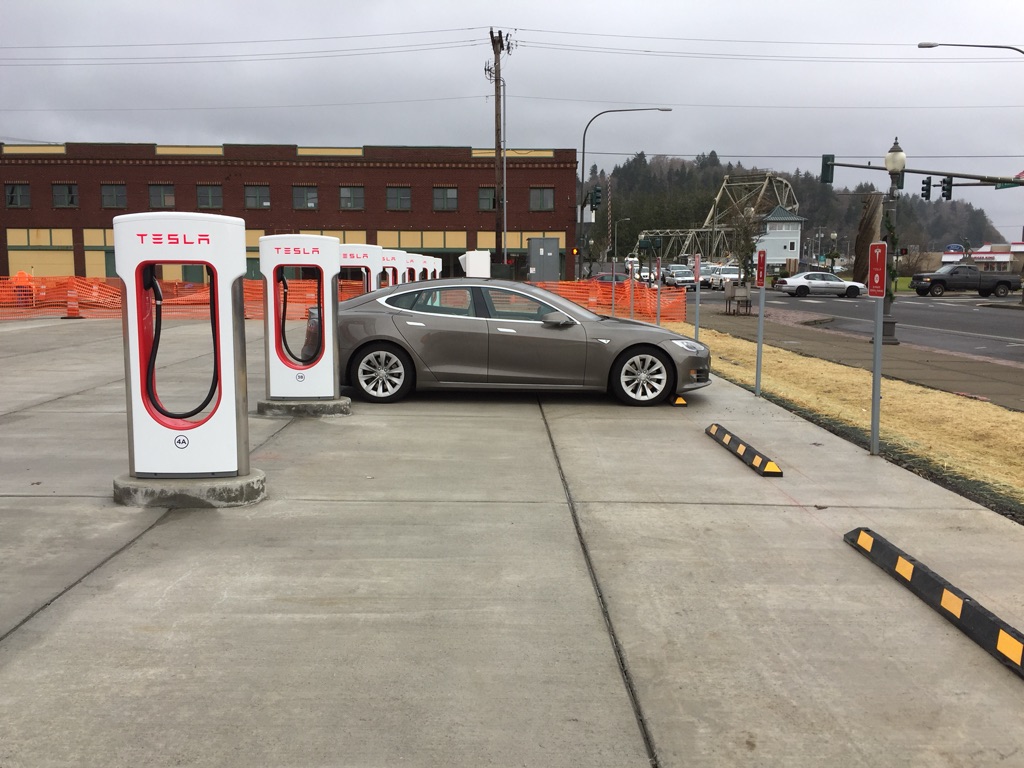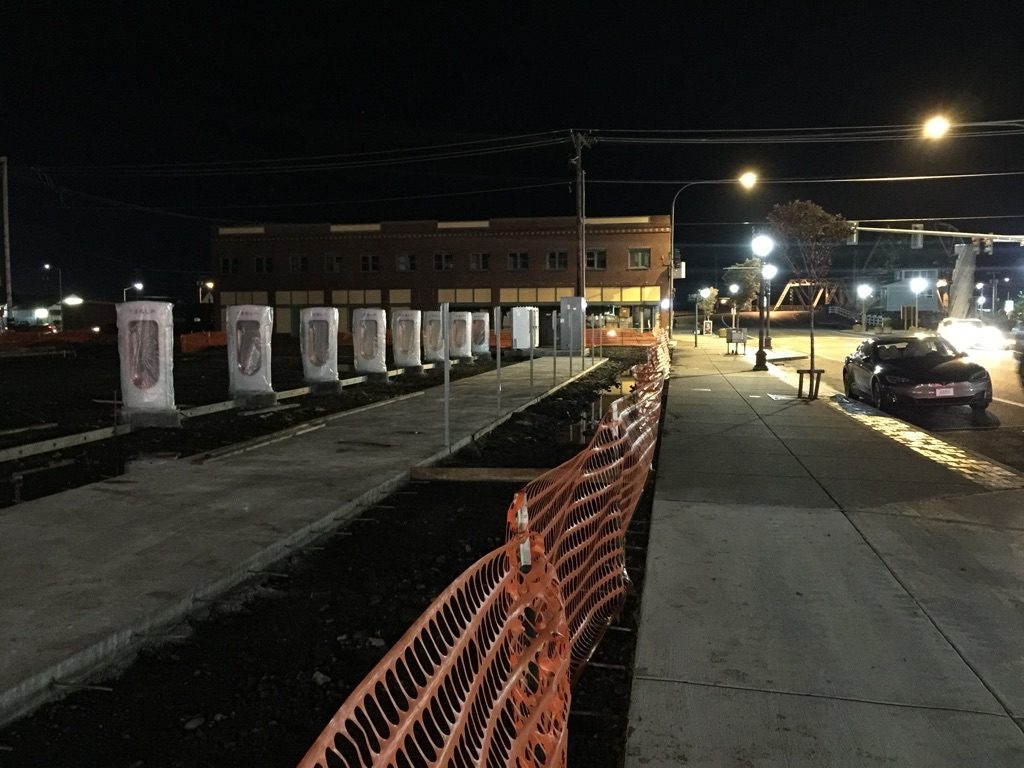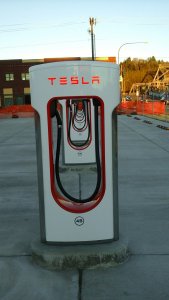News
Mayor tied to Tesla Supercharger site questioned over ‘conflict of interest’

He was young. Ambitious. Gifted. One of the greatest players to ever set foot on a professional baseball diamond, “Shoeless” Joe Jackson’s career ended in tatters for his alleged role in the infamous Chicago “Black Sox scandal” of 1919.
Call it a “conflict of interest.” It involved money. Lots of it.
Something else that involves money – lots of it – is afoot in Aberdeen, Washington: A Tesla Supercharger station and a “Gateway Center.” Aberdeen Mayor Erik Larson is a staunch proponent of both.
Updated: Mayor Larson fines himself $500 for violating the state’s conflict of interest ethics code
Mayor Larson is making the rounds looking for funding to help cover the costs of Gateway Center construction which is expected to cost upwards of $8M to complete, and incorporate Tesla’s Supercharger station into the design.
Questions within the community are swirling around what appears to be a conflict of interest regarding the mayor’s involvement in the Tesla deal. Documents have surfaced showing that the mayor has, or had, a financial interest in the electric car company that’s building the Supercharger station, apparently while he was negotiating with the company to bring the project to a city-owned lot. Why the station is being built on publicly owned land rather than on a private site is also in question.
Background
Mayor Larson negotiated the original agreement with Tesla for the charging station, which could have cost the city up to $2,000 a month in utility bills. The lease agreement came before the Aberdeen City Council for approval last summer. Originally, the City of Aberdeen was on the hook for paying electricity costs.

Tesla Supercharger station in Aberdeen, Washington during construction [Credit: Trebor Thickweb via app check-in]
As noted in the Aberdeen City Council meeting agenda dated July 13, 2016, the lease language at that time included (see page three):
“The Mayor has negotiated with Tesla Motors, Inc. for the construction of a Tesla supercharger station in Aberdeen on the city of the former Chevron station. The supercharger will be incorporated into the design of the Gateway Center. … the city will also be responsible for… paying the utility bills for Tesla vehicles that use the charging station, up to monthly cap of $2,000 per month.” (Emphasis added.)
Reading further, Item 8 of that actual lease agreement specifies that:
“Tesla agrees to arrange for all Tesla-related utility services provided or used in or at the Premises… Tesla shall pay directly to the utility company the cost of installation of any all such Tesla-related utility services and shall arrange to have the utility service separately metered. (Counterparty) shall be responsible for paying all utility bills related to such meter after installation, including payment for electricity consumed at the Premises during the Term, up to two thousand dollars ($2,000) per month.” (Emphasis added.)
Other Cities, Other Charging Stations
Tesla lease agreements with city governments aren’t new. Similar charging stations exist in five other Washington cities: Centralia, Burlington, Ellensburg, Kennewick, and Ritzville. There are eleven Supercharger stations in Oregon. All are located on either hotel/resort type private property or some other type of retail/outlet center. But the Aberdeen location is on a city-owned lot.
In California, two Supercharging stations on publicly owned property exist in Ukiah and Crescent City. But the terms negotiated by those cities for the stations are jarringly different from those negotiated for the Aberdeen site:
In Ukiah:
– “Tesla pays for the entire project, including staff time and utility costs.” (Ukiah Daily Journal, August 8, 2015.)
In Crescent City:
- The city is being paid by the tenant for use of its property. A proposal by Recargo, Inc. to build and operate a universal electric vehicle charging station in Crescent City included a $4,800 annual payment from Recargo to the district for use of the property. (Del Norte Triplicate, October 11, 2016.)
- “Essential components” of the city’s lease agreement with Tesla includes: “(1) the term, which is five years with two five-year options to renew, (2) Tesla will build and maintain the facility, and (3) the lease amount is one dollar per month.” (City of Crescent City Council Agenda Report, April 6, 2015.)
- Tenant “agrees to arrange for and pay for all Tenant-related utility services provided or used in or at the Premises during the term of the Lease.” (#10 – Utilities – City of Crescent City Ground Lease for Tesla Supercharging Station, April 6, 2015.)
- “Tenant shall pay directly to the utility company the cost of installation of any and all such Tenant-related utility services and shall arrange to have the utility service separately metered.” (#10, Utilities – City of Crescent City Ground Lease for Tesla Supercharging Station, April 6, 2015.)
In Aberdeen:
- The city (re: taxpayers) could get stuck with “up to 30,000 for the costs of installing the new infrastructure for the city” per the re-negotiated August agreement.
- The provision requiring the city to pay for electricity used by Tesla vehicles was removed.
- The proposed new lease requires Tesla to pay for all costs of charging Tesla vehicles.
- The lease also requires Tesla to install infrastructure “that would allow the city to add charging stations for other electric vehicles at some point in the future.”
- The city “will reimburse Tesla up to $30,000 for the costs of installing the new infrastructure for the city.” (Emphasis added.)
According to minutes from the August 24, 2016 Aberdeen City Council Meeting, a motion to adopt the re-negotiated lease agreement carried.
An interesting wrinkle, as announced by Tesla on November 7, 2016, is that Tesla has decided to stop offering unlimited free use of its network fast-charging stations worldwide beginning this year.
So, other than hopes of helping “attract potential tenants to the center as the first project participant” and providing “nearby restaurants and retailers with additional business” per Mayor Larson, just how, exactly, does the supercharging station tangibly benefit Aberdeen taxpayers or offset “up to $30,000” in reimbursements to Tesla “for the costs of installing the new infrastructure for the city”?
The Daily World reports that “A $30,000 grant will help Aberdeen reimburse Tesla for installing the station.” In light of the agreements hammered out with other cities for charging stations on public land, however, why is Aberdeen on the hook for reimbursing Tesla for any installation costs?
Another wrinkle:
According to an October 28, 2016 story in The Daily World, five Aberdeen sites were in the running as possible locations for the new Supercharger station, including the parking area for the Center. Larson explains:
“They (Tesla) could have easily worked with Gateway Mall or sought out private ownership, but they were interested in the Gateway Center parking lot.”
Why was a publicly owned site selected instead of a privately owned one? Is city government using public funds to compete with private business?
Additional questions swirl around Mayor Larson’s financial interest in Tesla Motors.
Some questions:
- Did Mayor Larson disclose his financial interest/common stock in Tesla Motor Company anywhere other than on his 2015 and 2016 PDC F-1 forms?
- As a candidate, Mayor Larson reported his stock value as $4.5K – $23.9K. After he was elected, he reported the value as $24K – 47.9K. What’s up with that?
- The mayor apparently handled all negotiations with Tesla, even though he had/has a financial interest in the motor company (See PDC F-1 forms, above). Did the city know about his financial interest in this company? If so, did it okay the mayor as negotiator of the Tesla lease agreement anyway? Why?
Perhaps a contract negotiator sans an apparent financial interest in the project under negotiation might be a good idea?
While we’re raising questions, what of Shoeless Joe? After the Black Sox scandal, Jackson never set foot on a professional baseball diamond again. He was banned for life along with seven other Chicago players for their alleged involvement in intentionally throwing the 1919 World Series to the Cincinnati Reds. Jackson’s alleged involvement in the conspiracy is still the subject of hot debate. Some maintain that the only things Joe was guilty of were being young, ambitious, gifted, and a bit naive.
Ring any bells?
Kristine Lowder
This guest post was written by Kristine Lowder of Conservelocity. Do you have a post you’d like to share? Email it to us at info@teslarati.com

Cybertruck
Tesla drops latest hint that new Cybertruck trim is selling like hotcakes
According to Tesla’s Online Design Studio, the new All-Wheel-Drive Cybertruck will now be delivered in April 2027. Earlier orders are still slated for early this Summer, but orders from here on forward are now officially pushed into next year:

Tesla’s new Cybertruck offering has had its delivery date pushed back once again. This is now the second time, and deliveries for the newest orders are now pushed well into 2027.
According to Tesla’s Online Design Studio, the new All-Wheel-Drive Cybertruck will now be delivered in April 2027. Earlier orders are still slated for early this Summer, but orders from here on forward are now officially pushed into next year:
🚨 Tesla has updated the $59,990 Cybertruck Dual Motor AWD’s estimated delivery date to April 2027.
First deliveries are still slated for June, but if you order it now, you’ll be waiting over a year.
Demand appears to be off the charts for the new Cybertruck and consumers are… pic.twitter.com/raDCCeC0zP
— TESLARATI (@Teslarati) February 26, 2026
Just three days ago, the initial delivery date of June 2026 was pushed back to early Fall, and now, that date has officially moved to April 2027.
The fact that Tesla has had to push back deliveries once again proves one of two things: either Tesla has slow production plans for the new Cybertruck trim, or demand is off the charts.
Judging by how Tesla is already planning to raise the price based on demand in just a few days, it seems like the company knows it is giving a tremendous deal on this spec of Cybertruck, and units are moving quickly.
That points more toward demand and not necessarily to slower production plans, but it is not confirmed.
Tesla Cybertruck’s newest trim will undergo massive change in ten days, Musk says
Tesla is set to hike the price on March 1, so tomorrow will be the final day to grab the new Cybertruck trim for just $59,990.
It features:
- Dual Motor AWD w/ est. 325 mi of range
- Powered tonneau cover
- Bed outlets (2x 120V + 1x 240V) & Powershare capability
- Coil springs w/ adaptive damping
- Heated first-row seats w/ textile material that is easy to clean
- Steer-by-wire & Four Wheel Steering
- 6’ x 4’ composite bed
- Towing capacity of up to 7,500 lbs
- Powered frunk
Interestingly, the price offering is fairly close to what Tesla unveiled back in late 2019.
Elon Musk
Elon Musk outlines plan for first Starship tower catch attempt
Musk confirmed that Starship V3 Ship 1 (SN1) is headed for ground tests and expressed strong confidence in the updated vehicle design.

Elon Musk has clarified when SpaceX will first attempt to catch Starship’s upper stage with its launch tower. The CEO’s update provides the clearest teaser yet for the spacecraft’s recovery roadmap.
Musk shared the details in recent posts on X. In his initial post, Musk confirmed that Starship V3 Ship 1 (SN1) is headed for ground tests and expressed strong confidence in the updated vehicle design.
“Starship V3 SN1 headed for ground tests. I am highly confident that the V3 design will achieve full reusability,” Musk wrote.
In a follow-up post, Musk addressed when SpaceX would attempt to catch the upper stage using the launch tower’s robotic arms.
“Should note that SpaceX will only try to catch the ship with the tower after two perfect soft landings in the ocean. The risk of the ship breaking up over land needs to be very low,” Musk clarified.
His remarks suggest that SpaceX is deliberately reducing risk before attempting a tower catch of Starship’s upper stage. Such a milestone would mark a major step towards the full reuse of the Starship system.
SpaceX is currently targeting the first Starship V3 flight of 2026 this coming March. The spacecraft’s V3 iteration is widely viewed as a key milestone in SpaceX’s long-term strategy to make Starship fully reusable.
Starship V3 features a number of key upgrades over its previous iterations. The vehicle is equipped with SpaceX’s Raptor V3 engines, which are designed to deliver significantly higher thrust than earlier versions while reducing cost and weight.
The V3 design is also expected to be optimized for manufacturability, a critical step if SpaceX intends to scale the spacecraft’s production toward frequent launches for Starlink, lunar missions, and eventually Mars.
News
Tesla FSD (Supervised) could be approved in the Netherlands next month: Musk
Musk shared the update during a recent interview at Giga Berlin.

Tesla CEO Elon Musk shared that Full Self-Driving (FSD) could receive regulatory approval in the Netherlands as soon as March 20, potentially marking a major step forward for Tesla’s advanced driver-assistance rollout in Europe.
Musk shared the update during a recent interview at Giga Berlin, noting that the date was provided by local authorities.
“Tesla has the most advanced real-world AI, and hopefully, it will be approved soon in Europe. We’re told by the authorities that March 20th, it’ll be approved in the Netherlands,’ what I was told,” Musk stated.
“Hopefully, that date remains the same. But I think people in Europe are going to be pretty blown away by how good the Tesla car AI is in being able to drive.”
Tesla’s FSD system relies on vision-based neural networks trained on real-world driving data, allowing vehicles to navigate using cameras and AI rather than traditional sensor-heavy solutions.
The performance of FSD Supervised has so far been impressive. As per Tesla’s safety report, Full Self-Driving Supervised has already traveled 8.3 billion miles. So far, vehicles operating with FSD Supervised engaged recorded one major collision every 5,300,676 miles.
In comparison, Teslas driven manually with Active Safety systems recorded one major collision every 2,175,763 miles, while Teslas driven manually without Active Safety recorded one major collision every 855,132 miles. The U.S. average during the same period was one major collision every 660,164 miles.
If approval is granted on March 20, the Netherlands could become the first European market to greenlight Tesla’s latest supervised FSD (Supervised) software under updated regulatory frameworks. Tesla has been working to secure expanded FSD access across Europe, where regulatory standards differ significantly from those in the United States. Approval in the Netherlands would likely serve as a foundation for broader EU adoption, though additional country-level clearances may still be required.









